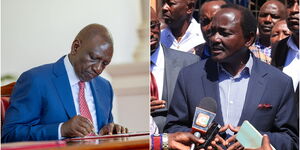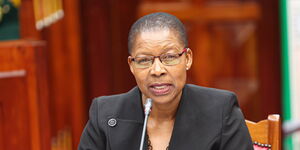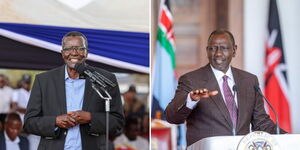Kiambu Senator Karungo wa Thang'wa recently alleged that powerful forces are behind the controversial bill seeking to extend the terms of leaders holding public office from five to seven years.
The bill, brought forth by Senator Thang'wa's Nandi counterpart Samson Cherargei, has been undergoing public participation since October 2 amid public outrage from a majority of Kenyans.
Speaking during a show on Monday, Senator Thang'wa shed some light on the controversial bill as he disputed Cherargei's initial claims which saw the Nandi Senator take full responsibility for the bill.
The Senator cited the National Dialogue Committee (NADCO) report which, with the help of a panel selected by both President William Ruto and former ODM leader Raila Odinga, brought forth several issues including a proposed extension of term limits.
They came up with a report that brought the issues of IEBC, changing the constitution, women representation and so on," the Senator said. "The NADCO report also proposed increased of term limits."
According to the Senator, contrary to belief that Cherargei was the mastermind behind the bill, there were other elements who were pushing the Nandi Senator.
He added, "This thing is not being pushed by Cherargei. There are people pushing it behind the scenes because they know they are not coming back in 2027.
Senator Thang'wa further observed how sections of Kenyans lost faith in some of their lawmakers after they voted Yes to the controversial Finance Bill in June 2024. This, according to Thang'wa prompted some of the legislators to seek mechanisms to extend their terms in office.
The bigger picture: Meanwhile, Senator Cherargei succumbed to pressure following the mass rejection of his bill as he vowed to review the provisions following the end of the public participation exercise.
“I agree entirely, in principle (without proposal) with you and I am waiting for the committee report because there is a procedure for doing that," he said.
After the public participation exercise, more than 240,000 Kenyans sent their memoranda expressing their outrage, leading to the jamming of the Senate's email system.
Cherargei's key argument in the proposed extension of term limits was that five years was not enough time for leaders to efficiently execute their development agenda. “Even as we speak today, we are about three years to the next election but we are in a campaign mood. There is no time to work," he claimed.












